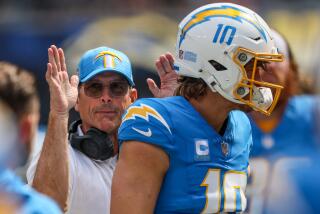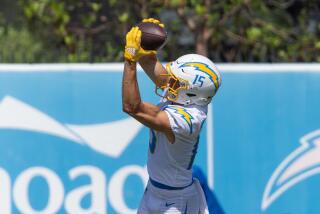Let These Rookies Beware
- Share via
CARLSBAD, Calif. — It lacks the rumbling flair of a Cadillac SUV and the gaudy sparkle of dime-sized diamond studs, but the latest must-have item for NFL rookies might be worth more than both: a document shredder.
“The dumpster divers can steal a lot of information,” said Milt Ahlerich, a former FBI executive now the NFL’s senior director of security. “Once you’ve been victimized, it’s very hard to undo.”
The crime is called identity theft, the hijacking of someone’s personal information such as credit card or Social Security numbers and using them to steal or commit fraud. It is one of the country’s fastest-growing crimes, and, Ahlerich said, the number of NFL players, coaches and executives burned by the scam has increased dramatically during the last three years. He said his office receives at least one call a week from someone whose information has fallen into the wrong hands.
Identity theft was the leading consumer-fraud complaint reported last year, accounting for 42% of the 204,000 complaints received by the Federal Trade Commission. According to privacy advocates, as many as 750,000 Americans may be victims of the crime each year.
Ahlerich was a featured speaker at the NFL rookie symposium earlier this week at the La Costa Resort and Spa. The four-day seminar was mandatory for all drafted rookies and covered an array of subjects, from HIV awareness, to dealing with the media, to sniffing out unscrupulous financial advisors. Among the speakers were Denver Coach Mike Shanahan; veteran players such as Keyshawn Johnson, John Lynch, Marcellus Wiley and Troy Vincent; and some second-year players a year removed from the symposium.
“This is some stuff we didn’t learn in college,” said Buffalo rookie Mike Williams, drafted fourth overall. “You go from your parents’ house to college and you’ve been shielded. This is bringing us into the real world.”
Danny Wuerffel, the 1996 Heisman Trophy winner, got a real-world reminder two years ago when he was a backup quarterback in Green Bay. He got a call from the Home Depot credit department, asking if he had just applied for a $16,000 home-improvement loan at a store in South Plainfield, N.J. He had not.
Turns out, a scam artist had applied for the loan using Wuerffel’s name, birth date and Social Security number. He aroused suspicion, though, when he misspelled Destin, Fla., where the player lives in the off-season. It escaped notice that the impostor was described as a slender black man in his mid-30s. Wuerffel, then 26, is white, 6 feet 1 and 212 pounds.
“You’re going to see a 5-foot-1 guy standing in line at a club, dressed in Carolina blue, with a big cubic zirconium in his ear, talking about, ‘I’m Julius Peppers,’ ” Matt Couloute Jr., NFL security player liaison, said in a conference room full of rookies Monday. The gathering included the real Peppers, a 6-6 defensive end drafted No. 2 by the Carolina Panthers.
Couloute, a former prosecutor, told the players they should not only use a shredder to dispose of unnecessary personal documents, but to avoid using the mailboxes at their houses or apartments and instead use the post office. He also urged players to routinely get credit reports.
Ahlerich said, “We’ve gotten very proactive about it. We’ve done a lot to educate people.”
There might have been a spike of activity in recent years, but impersonating NFL players is nothing new. Hall of Fame cornerback Mike Haynes, who oversaw the rookie symposium in his role as NFL vice president of player and employee development, said he once was victimized by such a scam.
“There was a guy who ran up a bill on my credit card in Europe,” he said. “I hadn’t even been to Europe at that point.”
Among the more brazen NFL impersonators:
* A man in Tampa, Fla., bilked several women out of more than $2,000 last year by assuming the identities of Buccaneer receiver Jacquez Green and Cedric King, brother of Tampa Bay quarterback Shaun King.
* Two years ago, a man in St. Louis pleaded guilty to using a false Social Security number, other false identification and claiming to be then-Ram linebacker London Fletcher. The impostor racked up more than $30,000 in hospital bills and told hospital officials the Rams or NFL insurance would pay for the treatment. The reason for the treatments was not disclosed. The man was thoughtful enough to sign autographs for fellow patients from time to time.
* In 1999, a 6-7, 305-pound Nebraska man posed first as 49er tight end Chad Fann, then as Bengal tackle Jamain Stephens, to receive free hotel rooms, meals and limousine rides in Las Vegas.
Darryl Ashmore, now an offensive lineman for the Raiders, was burned by an impostor in 1993, during his second season with the then-Los Angeles Rams. A man claiming to be Ashmore spent his nights bar-hopping in L.A., slamming down free drinks, picking up women, and selling leather jackets and bogus Super Bowl tickets. The man also opened a checking account in Ashmore’s name and somehow learned his Social Security number--although it turned out he was one number off. NFL security and the FBI tried to track down the impostor, but Ashmore caught up to him first.
“We wound up in the same bar,” Ashmore said a few years ago. “Somebody pointed him out to me and I went up to him and said, ‘Hey, you need to stop.’ He said, ‘Nah, it’s not me. That’s the guy who was doing it.’ He pointed to one of his friends. I went to get the bouncer and the manager and, the next thing you know, the guy fled with his friend.... “ The part Ashmore found most galling: “He was a big, sloppy guy about 6-3, 300. He looked like he hadn’t played a lick of football in his life.” Eventually, the phony was nabbed by NFL security, arrested and brought to trial, where, Ashmore said, “He got a slap on the wrist.”
Not surprisingly, the man did not abandon his scheme and a few months later was arrested in Las Vegas for impersonating former Arizona Cardinal defensive lineman Michael Bankston.
“The thing about [the impostor] is, he came from a good family and a good upbringing, but he played this game,” Ashmore said. “This was his full-time job, going out to nightclubs every night of the week. Kind of sickening, isn’t it?”
The experience made Ashmore much more wary about signing autographs and telling people too much about himself. He signs footballs from time to time, but not the same way he signs his checks.
“When I sign an autograph, you really can’t read it,” he said. “I can’t read my own writing. I sign my checks where it’s really nice handwriting, where you can read every letter. You really can’t protect yourself against a lot of things. In the computer age, anyone can get anything now. You never know.”
More to Read
Go beyond the scoreboard
Get the latest on L.A.'s teams in the daily Sports Report newsletter.
You may occasionally receive promotional content from the Los Angeles Times.











